Market Data

September 22, 2022
July Shipments and Supply of Steel Products
Written by David Schollaert
Total mill shipments of steel products were largely sideways in July, up marginally when compared to June. Mill shipments have been fluctuating up and down all year with little consistency. July’s mill shipments totaled 8.11 million tons, a 0.3% increase from June’s 8.09 million tons. Apparent supply also saw a slight gain in July, up just 1.1% versus the prior month.
This analysis is based on steel mill shipment data from the American Iron and Steel Institute (AISI) and import-export data from the US Department of Commerce (DOC). The analysis summarizes total steel supply by product from 2009 through July 2022 and year-on-year changes.
The supply/demand differential remains in place with supply still topping demand even though both edged in July. Apparent supply (domestic shipments plus imports) in July was still more than 11% above domestic shipments totals, while export totals were down (-8%) over the same period. Imports were lower month-on-month (MoM), down 1.3% in July versus June’s total.
Domestic mill utilization averaged 79.4% through July, down roughly two percentage points from June’s 81% and down 5.6% versus the same year-ago period.
Prices began sliding in May once raw material availability due to the war in Ukraine began to fade and accelerated through July as supply outpaced demand.
SMU’s benchmark hot-rolled coil price declined by roughly $186 per net ton ($9.30 per cwt) in July. It had peaked at $1,480 per ton during the week of April 19 and has been declining since. HRC prices closed out July at an average of $840 per ton FOB mill, east of the Rockies on July 26. Prices declined throughout the month, a trend that accelerated and has carried well into early September.
The earlier price bounce reflected uncertainty stemming from the war in Ukraine and the subsequent sanctions against Russian enterprises. The market has reset since, bringing prices down. According to SMU’s latest check of the market on Sept. 20, the price for HRC is averaging $770 per ton. Raw steel production, shown below in Figure 1, is based on weekly data from the AISI. It is displayed here as four-week moving averages through July 30, 2022.
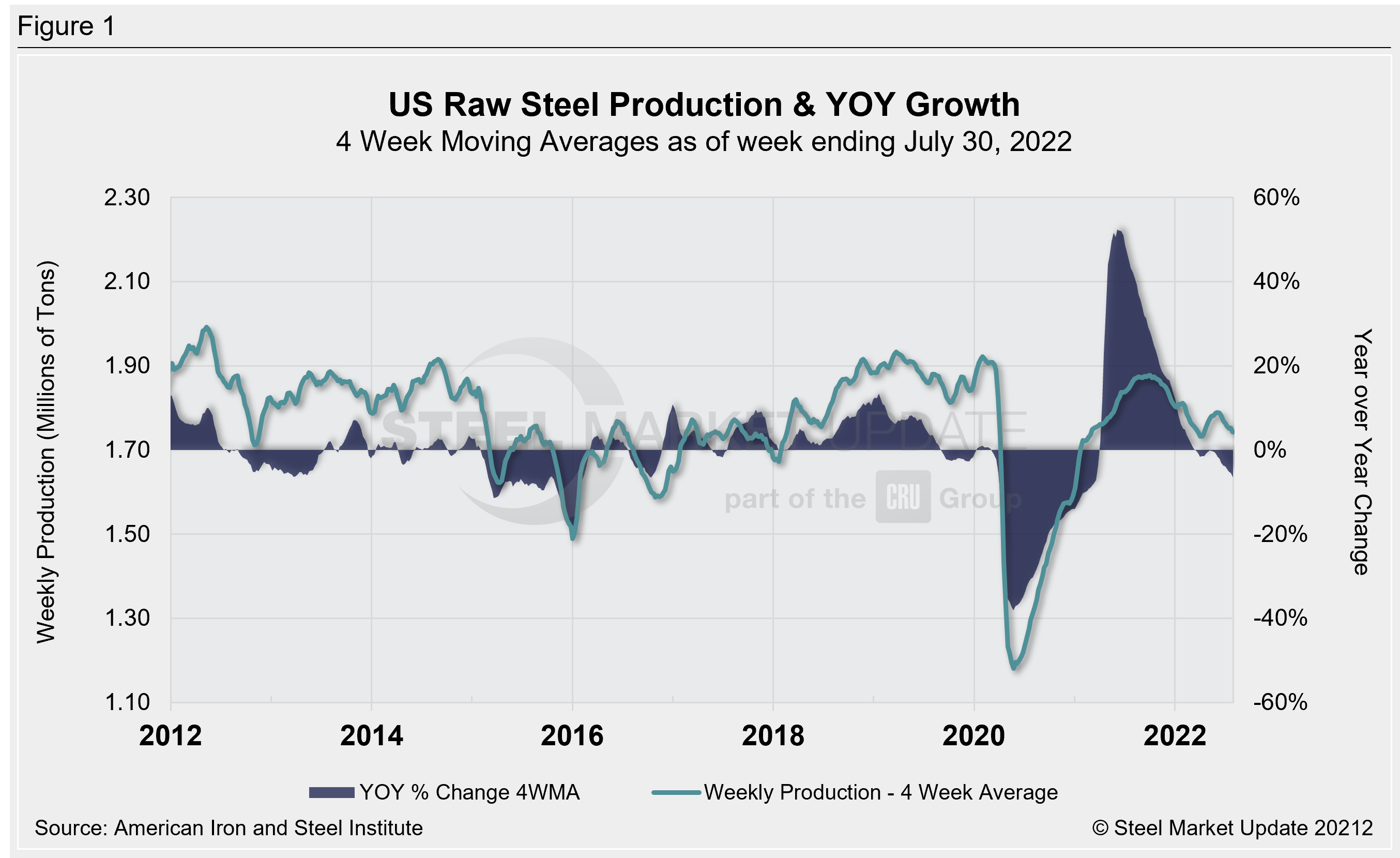
Monthly shipment data for all rolled steel products and exports are noted in Figure 2. Measured as a three-month moving average (3MMA) of the monthly data, July’s total was 8.138 million tons, practically unchanged (-0.03%) versus 8.140 million tons in June. Monthly shipments have increased only once monthly over the past nine months for the 3MMA analysis. Shipments were down 6.9% in July versus the year prior when shipments were 8.665 million tons. The recovery from Covid-related shutdowns just over two years ago was meaningful. But July’s shipments were 27.7% below the post-Covid-related closure run-up in July 2020 and below the same pre-pandemic period in 2019 by 4.4%.
All rolled product exports totaled 750,288 tons in July, down 8% MoM but 15.6% higher versus the same year-ago period. Despite the declines, July’s total is still the fifth-highest export mark in more than four years.
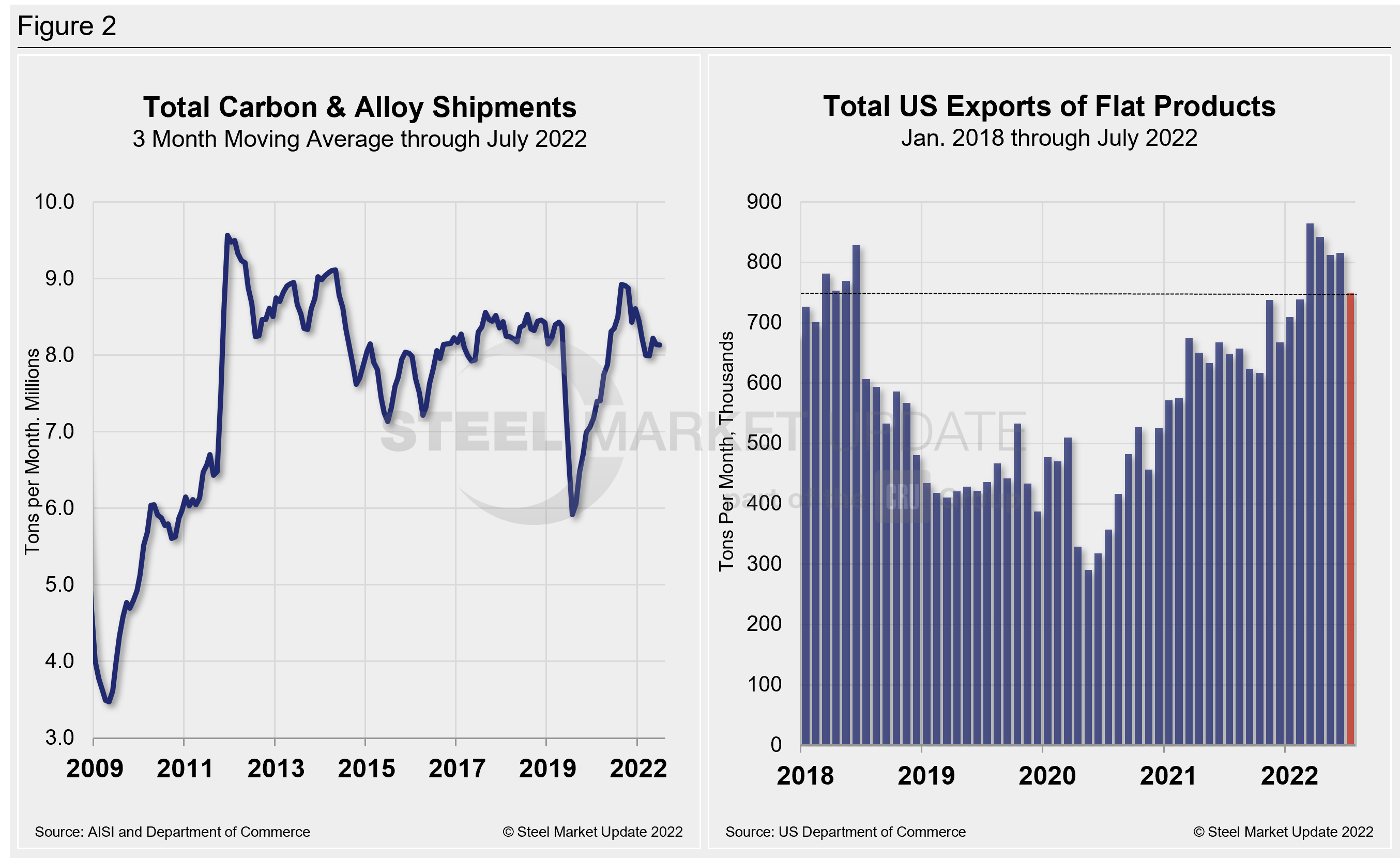
Shipment and supply details for all product groups and individual sheet products are noted in Table 1. Domestic supply (shipments and imports) is shown in Table 2. Total supply (a proxy for market demand) as a 3MMA was down year-on-year (YoY) in July, and well behind the 34.1% growth seen the year prior—when the market was recovering ground lost during the early pandemic-related disruptions.
Apparent supply is defined as domestic mill shipments to domestic locations plus imports. Mill shipments were down more than 4% and a far cry from the 40.2% growth seen during the year-ago period in the same 3MMA comparison. The recovery has varied significantly among various products. But it should remain relatively on a similar trajectory despite some declines in domestic output, even as foreign material continues to trickle into US ports at current or similar rates.
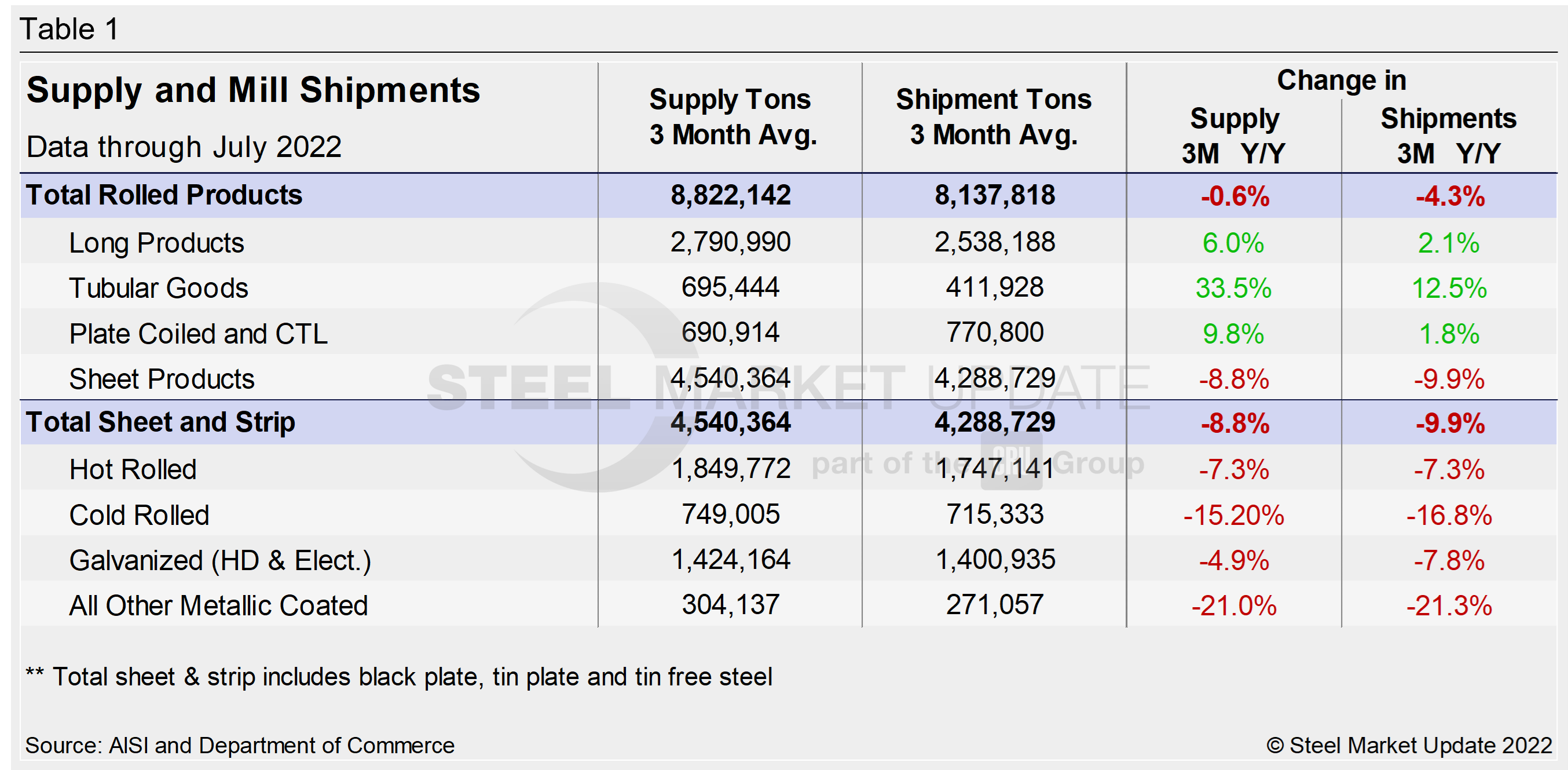
Total sheet and strip apparent supply is down year-to-date (Table 2) compared to 2021. It is down 0.1% over the past three months but down approximately 2.2% MoM. Total rolled product apparent supply is up over the same year-ago period and still trending up on a three-month moving average basis. Note that year-over-year comparisons have seasonality removed.
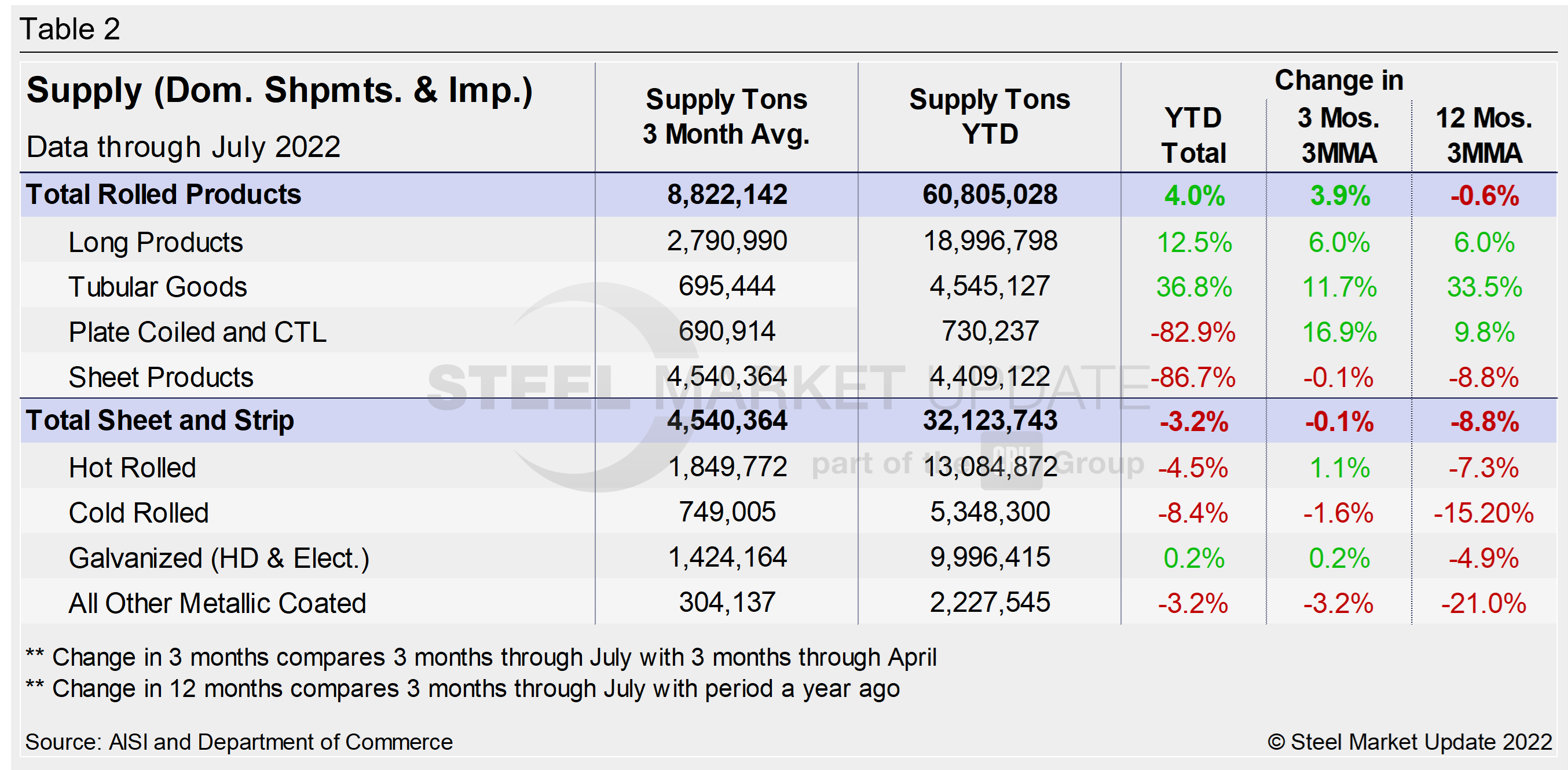
The supply picture for HRC, CRC, and HDG since January 2009 as three-month moving averages versus the long-term comparison between flat and long products is shown side-by-side in Figure 3. On the left chart, all three sheet products are displayed. They had experienced some improvement since mid-2020 but have now been trending downward through July. When compared to the same pre-pandemic period in 2019, all three are down. Supplies of cold rolled have seen the largest percentage decline (-14.7%), followed by galvanized (hot dipped and electrolytic) down just 2.2%, and hot rolled down just -1.9% from the same pre-pandemic period in 2019. In the right chart, note that these are monthly numbers (not 3MMAs), which show the trend difference between longs and flat products including plate.
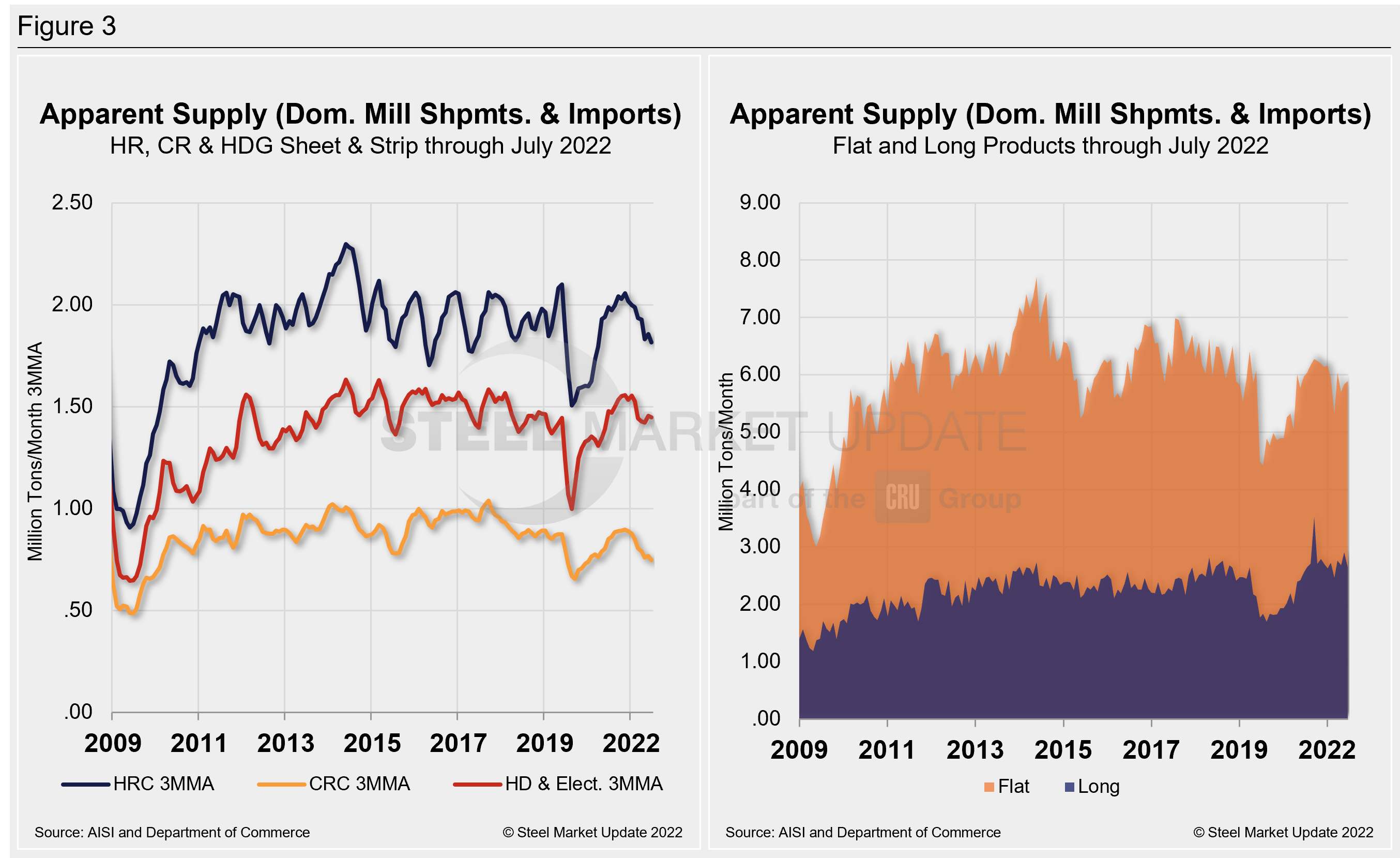
By David Schollaert, David@SteelMarketUpdate.com







